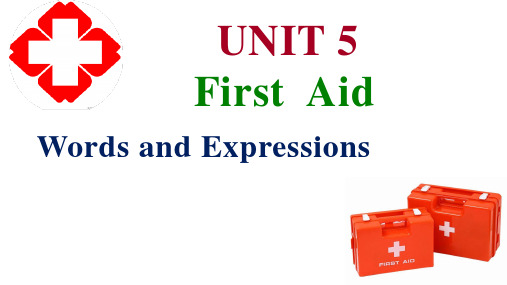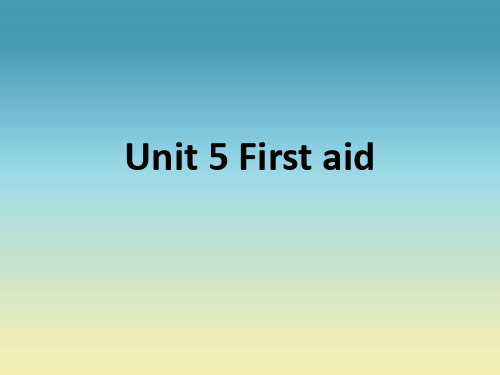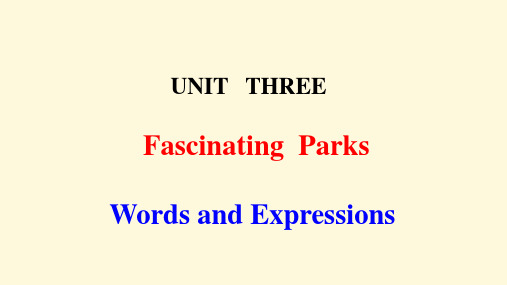《重点单词讲解》PPT课件
合集下载
Unit 5 重点单词讲解课件-高中英语人教版(2019)选择性必修第二册

UNIT 5 First Aid
Words and Expressions
1. technique n. 技能;技术;技艺
(多指某一领域(如艺术、体育等))的专门技术或技巧
technical adj. 技术的; 工艺的 technician n. 技术员,技师 technology n. 技术;工艺
•at ease 舒适 •with ease 轻易地;毫不费力地 •feel/be at ease 感到心情放松 •put sb at ease 使某人放松
•ease one’s mind 使某人安心,宽慰某人 •ease sb. of sth. 减轻某人的(痛苦、负担等)
单句填空/完成句子
①The news that her son was safe finally eased her __o_f_
处于良好状态
4). Be careful! The bottom of the pool is very __sl_ip_p_e_ry___(slip). adj .滑的
13. delay vi.& vt.推迟;延期(做某事) vt.耽误;耽搁 n.延误;耽搁(的时间);推迟
delay doing sth 拖延做某事 without delay毫不拖延;立刻
16.interrupt vt.& vi.打断;打扰 vt.使暂停;使中断
be interrupted by 被……打断/阻断 interruption n.打扰;插嘴;打岔;阻断物 without interruption连续地;不断地
1)He was writing a poem when he was interrupted by a knock at the door. 2) She has kept up physical training for several years without interruption.
Words and Expressions
1. technique n. 技能;技术;技艺
(多指某一领域(如艺术、体育等))的专门技术或技巧
technical adj. 技术的; 工艺的 technician n. 技术员,技师 technology n. 技术;工艺
•at ease 舒适 •with ease 轻易地;毫不费力地 •feel/be at ease 感到心情放松 •put sb at ease 使某人放松
•ease one’s mind 使某人安心,宽慰某人 •ease sb. of sth. 减轻某人的(痛苦、负担等)
单句填空/完成句子
①The news that her son was safe finally eased her __o_f_
处于良好状态
4). Be careful! The bottom of the pool is very __sl_ip_p_e_ry___(slip). adj .滑的
13. delay vi.& vt.推迟;延期(做某事) vt.耽误;耽搁 n.延误;耽搁(的时间);推迟
delay doing sth 拖延做某事 without delay毫不拖延;立刻
16.interrupt vt.& vi.打断;打扰 vt.使暂停;使中断
be interrupted by 被……打断/阻断 interruption n.打扰;插嘴;打岔;阻断物 without interruption连续地;不断地
1)He was writing a poem when he was interrupted by a knock at the door. 2) She has kept up physical training for several years without interruption.
Unit 1 Art Words and expressions重点单词讲解课件高中英语选择性必修三

exhibit vt. 展览;显示;
10.recognition n. 承认;认出;赞誉 facial recognition 面部识别
beyond recognition 辨认不出
There is a general recognition of the urgent need for
reform.
7.representative adj. 典型的,有代表性的 n. 代表
a sales representative 销售代表 be representative of 是有代表性的…
The painting is not representative of his work of
the period. represent v.代表,象征=stand for 代表 representation n 代表;描绘;表现;陈述
单句填空
① His suggestions is worthy of _c_o_n_si_d_e_r_a_t_io_n(consider). His suggestions is worthy of b_e_i_n_g_c_o_n_s_i_d_e_re_d(consider). =His suggestions is worthy __to__b_e_c_o_n_s_i_d_e_re_d_ (consider).
完成句子
1.Jack _is_p_a_r_t_ic_u_la_r_a_b_o_u_t_/o_v_e_r_f_oo_d_ (很挑食), which makes it difficult for his servants to serve him.
2.Helen在艺术方面很有天赋,特别是绘画。
Helen is gifted in art, _in__p_ar_t_ic_u_l_a_r/_p_a_rt_i_cu_l_arly drawing.
10.recognition n. 承认;认出;赞誉 facial recognition 面部识别
beyond recognition 辨认不出
There is a general recognition of the urgent need for
reform.
7.representative adj. 典型的,有代表性的 n. 代表
a sales representative 销售代表 be representative of 是有代表性的…
The painting is not representative of his work of
the period. represent v.代表,象征=stand for 代表 representation n 代表;描绘;表现;陈述
单句填空
① His suggestions is worthy of _c_o_n_si_d_e_r_a_t_io_n(consider). His suggestions is worthy of b_e_i_n_g_c_o_n_s_i_d_e_re_d(consider). =His suggestions is worthy __to__b_e_c_o_n_s_i_d_e_re_d_ (consider).
完成句子
1.Jack _is_p_a_r_t_ic_u_la_r_a_b_o_u_t_/o_v_e_r_f_oo_d_ (很挑食), which makes it difficult for his servants to serve him.
2.Helen在艺术方面很有天赋,特别是绘画。
Helen is gifted in art, _in__p_ar_t_ic_u_l_a_r/_p_a_rt_i_cu_l_arly drawing.
U2L1重点单词讲解(课堂PPT)

7
4.character n. 人物,角色;性质;特色;性格;汉字 in character符合某人性格;风格相同(with sth.) out of character 不符合某人性格 build (up) one’s character磨练意志 a major/leading character主角 Chinese characters汉字
6
earthquakes often leave many people homeless.
Likewise, D can also produce the same result.
A.Cruel;much too violence B.Cruel;too many violences C.Violent;quite a few violence D.Violent;too much violence
指人的镇定沉着、不慌乱,不受外界影响和情绪支配。 quiet: 普通用词,指没有喧闹、活动或骚乱的寂静状态。 still: 指平静而又安定的状态。 silent:普通用词,指缄默不语或无声无息
3
2. generous adj 慷慨的,大方的;大量的,丰富的 generously adv. 大方地;宽宏大量地 (反义词 Hale Waihona Puke elfishly)重点单词讲解
1
1. calm adj. 镇静的,沉着的
We should keep calm when we are in danger.
当我们处于危险的时候,要保持镇静。
2. calm v. (使)平静;(使)镇静
Moved by what she said, he could hardly calm down.
哥伦布在1492年发现了美洲。
4.character n. 人物,角色;性质;特色;性格;汉字 in character符合某人性格;风格相同(with sth.) out of character 不符合某人性格 build (up) one’s character磨练意志 a major/leading character主角 Chinese characters汉字
6
earthquakes often leave many people homeless.
Likewise, D can also produce the same result.
A.Cruel;much too violence B.Cruel;too many violences C.Violent;quite a few violence D.Violent;too much violence
指人的镇定沉着、不慌乱,不受外界影响和情绪支配。 quiet: 普通用词,指没有喧闹、活动或骚乱的寂静状态。 still: 指平静而又安定的状态。 silent:普通用词,指缄默不语或无声无息
3
2. generous adj 慷慨的,大方的;大量的,丰富的 generously adv. 大方地;宽宏大量地 (反义词 Hale Waihona Puke elfishly)重点单词讲解
1
1. calm adj. 镇静的,沉着的
We should keep calm when we are in danger.
当我们处于危险的时候,要保持镇静。
2. calm v. (使)平静;(使)镇静
Moved by what she said, he could hardly calm down.
哥伦布在1492年发现了美洲。
牛津高中英语模块七Unit2重点单词讲解PPT课件

拓展: (1)astonish sb. 使某人吃惊 (2)astonished adj. 感到十分吃惊的
astonishing adj. 令人十分吃惊的 (3)be astonished at... 对......感到惊讶
I was astonished at her remark. 我对她的评论感到惊讶。
As teachers, we should encourage every student to
realize their full potential. 作为老师,我们应该鼓励每一个学生充分发挥他们
的潜能。
4. astonish vt. 使十分惊讶,是吃惊
What they did astonished almost all the Chinese people. 他们的所作所为使得几乎所有中国人都十分吃惊。
(4) astonishment n. to one's astonishment 令某人吃惊的是
• To our astonishment, the Dragon Boat Festival has been declared by Korea one of their world cultural heritages.
牛津高中英语模块七Unit2重点单词讲 解PPT 课件
牛津高中英语模块七Unit2重点单词讲 解PPT 课件
•
try for sth.
试图获得;争取
• eg. He was then trying for a new job.
• 当时他正在谋求一份新工作。 • try on 试穿
• Look at the beautiful coat. Will you try it on?
astonishing adj. 令人十分吃惊的 (3)be astonished at... 对......感到惊讶
I was astonished at her remark. 我对她的评论感到惊讶。
As teachers, we should encourage every student to
realize their full potential. 作为老师,我们应该鼓励每一个学生充分发挥他们
的潜能。
4. astonish vt. 使十分惊讶,是吃惊
What they did astonished almost all the Chinese people. 他们的所作所为使得几乎所有中国人都十分吃惊。
(4) astonishment n. to one's astonishment 令某人吃惊的是
• To our astonishment, the Dragon Boat Festival has been declared by Korea one of their world cultural heritages.
牛津高中英语模块七Unit2重点单词讲 解PPT 课件
牛津高中英语模块七Unit2重点单词讲 解PPT 课件
•
try for sth.
试图获得;争取
• eg. He was then trying for a new job.
• 当时他正在谋求一份新工作。 • try on 试穿
• Look at the beautiful coat. Will you try it on?
《U2重点单词讲解》课件

详细描述
通过创造有趣、生动、富有想象力的联想,将单词与已知的事物关联起来,形成深刻的印象,从而更轻松地记住 单词。例如,将“cat”(猫)与“hat”(帽子)联系起来,想象一只戴着帽子的猫,这样更容易记住这两个单 词。
语境记忆法
总结词
将单词放入句子或段落中,通过上下文语境来记忆单词。
详细描述
将单词放入具体的语境中,如句子、段落或对话中,通过理 解单词在句子或段落中的意思和用法,来加深对单词的记忆 。这种方法有助于理解单词的用法和搭配,提高记忆效果。
反义词
反义词是指意思相反或相对的词,例 如“大”和“小”就是反义词。介绍 反义词有助于学生更全面地理解单词 的含义,并能够在语境中更好地运用 。
相关短语与固定搭配
相关短语
讲解单词时,可以介绍一些与该单词相 关的常用短语,例如“make a mistake”和“correct the mistake”。 这些短语能够帮助学生在实际语境中更 好地运用单词。
反复复习法
总结词
定期重复复习已学过的单词,以加强记忆。
详细描述
制定一个复习计划,定期回顾已学过的单词。通过不断重复复习,巩固记忆,使新学单词逐渐成为长 期记忆的一部分。这种方法需要耐心和坚持,但效果显著,有助于长期记忆单词。
PART 04
U2单词扩展
同义词与反义词
同义词
同义词是指意思相近或相同的词,例 如“美丽”和“漂亮”就是同义词。 在讲解单词时,可以介绍一些同义词 ,帮助学生更丰富地表达意思。
PART 02
U2重点单词详解
单词拼写与发音
总结词
掌握正确的拼写与发音是学习英语单 词的基础。
详细描述
对于每个重点单词,提供正确的拼写 形式,并附上音标,以便学生正确发 音。同时,对于发音难点和注意事项 ,进行特别标注和讲解。
通过创造有趣、生动、富有想象力的联想,将单词与已知的事物关联起来,形成深刻的印象,从而更轻松地记住 单词。例如,将“cat”(猫)与“hat”(帽子)联系起来,想象一只戴着帽子的猫,这样更容易记住这两个单 词。
语境记忆法
总结词
将单词放入句子或段落中,通过上下文语境来记忆单词。
详细描述
将单词放入具体的语境中,如句子、段落或对话中,通过理 解单词在句子或段落中的意思和用法,来加深对单词的记忆 。这种方法有助于理解单词的用法和搭配,提高记忆效果。
反义词
反义词是指意思相反或相对的词,例 如“大”和“小”就是反义词。介绍 反义词有助于学生更全面地理解单词 的含义,并能够在语境中更好地运用 。
相关短语与固定搭配
相关短语
讲解单词时,可以介绍一些与该单词相 关的常用短语,例如“make a mistake”和“correct the mistake”。 这些短语能够帮助学生在实际语境中更 好地运用单词。
反复复习法
总结词
定期重复复习已学过的单词,以加强记忆。
详细描述
制定一个复习计划,定期回顾已学过的单词。通过不断重复复习,巩固记忆,使新学单词逐渐成为长 期记忆的一部分。这种方法需要耐心和坚持,但效果显著,有助于长期记忆单词。
PART 04
U2单词扩展
同义词与反义词
同义词
同义词是指意思相近或相同的词,例 如“美丽”和“漂亮”就是同义词。 在讲解单词时,可以介绍一些同义词 ,帮助学生更丰富地表达意思。
PART 02
U2重点单词详解
单词拼写与发音
总结词
掌握正确的拼写与发音是学习英语单 词的基础。
详细描述
对于每个重点单词,提供正确的拼写 形式,并附上音标,以便学生正确发 音。同时,对于发音难点和注意事项 ,进行特别标注和讲解。
First aid重点单词讲解.ppt

字典对学一门新语言有帮助。
A dictionary is an aid for learning a new language.
我打算去参加一门急救课程。
I’m going to have/take a first aid course.
当我陷入困境的时候,他立刻来帮我。
He comes to my aid at once when I am in trouble.
injure 指由于意外或事故而受伤,也可指无形的伤 害.
wound指外界暴力引起的皮肉伤,是出血的严重 的伤,尤指战场中的伤害.
hurt 多指精神上或肉体上受到的伤害,含有较强 烈的疼痛意味.
harm指精神或肉体上的损害,但不表示伤痛.可指 对抽象事物.
Two people have been seriously _i_n_ju_r_e_d_ in the road accident. We won’t do anything that will _h_a_rm__ the cause of peace. He felt rather _h_u__rt_ at your words.
这些蘑菇含有致命的毒素。
These mushrooms contain a deadly poison. 2)vt. 毒药,毒害;毒害,使中毒
Tom feared that someone had poisoned his food.
These violent Байду номын сангаасideos poisoned the minds of the young.
escape injury
免受伤害
serious/severe injuries 重伤
Unit 4单元重点单词短语讲解课件 人教版九年级英语全册

❖ 14. relax ❖ v. 让某人感到轻松 ❖ adj. relaxed/relaxing ❖ 15. strict ❖ adj. 严格的,严厉的 ❖ 常见搭配: ❖ be strict with sb 对某人要求严格 ❖ be strict in sth 对某事要求严格
❖ 16.fail ❖ v. 失败 ❖ 名词 failure 失败 ❖ 常见搭配: ❖ fail in doing 失败做某事 ❖ fail to do 未能做某事/忘记做某事
❖ 6. absent ❖ adj. 缺席的,不在场的 ❖ 词形变化: ❖ n. absence 缺席 ❖ 常见短语: ❖ be absent from 缺席,不参加...
❖ 7.general ❖ adj. 一般的,普通的 ❖ 词形变化: ❖ adv generally ❖ 常见搭配: ❖ in general 一般而言,大体上
❖ 8.helpful ❖ adj. 有用的,有帮助的 ❖ 词形变化:n/v help 帮助 ❖ 反义词 helpless 无帮助的,无用的 ❖ 常用搭配: ❖ be helpful to 对某人/某物有帮助 ❖ 9. seld0. advise ❖ v. 建议 ❖ 词形变化:n. advice 建议 ❖ 常用搭配: ❖ advise sb to do sth 建议某人做某事 ❖ advise doing 建议做某事
❖ 3. interview ❖ v. 采访 ❖ 词形变化: ❖ n. 记者 interviewer ❖ n. 被采访者 interviewee ❖ 4. private ❖ adj. 私人的 ❖ 反义词: public 公开的
❖ 5. influence ❖ n. 对某人、物产生的影响 ❖ v. 对某人、物产生影响 ❖ 常见短语: ❖ have an influence on sb. ❖ influence sb./sth. Computer has an influence on us. Computer influence us.
人教版八年级下nit 2 I will help to claean up the city parks 重点单词讲解课件(PPT41张)

people can’t see. 聋人听不见,失明的人看不见。
Or imagine you can’t walk or use your hands easily. imagine v. n. 想象;设想 e.g. You don’t imagine it is true. 你别想象那是真的。
imagine doing sth
fix v. 安装;使固定 e.g. The nail doesn’t fix well.
这个钉子不牢固。
give away 赠送;捐赠 e.g. They gave away 5,000 bags for shopping at the exhibition. 在展览会上,我们赠送了五千 只购物袋。
call up 意为“打电话,打电话给……”。如: He called up his friends and told the story.他
给朋友打电话,并告之整个事情。 【拓展】
有关“打电话”的说法: (1)make a telephone call打电话
He’s making a telephone call.他正在打电话。 (2)give sb. a call/ring 给某人打电话
Very hard training is necessary. 刻苦训练很必要。
train to do sth 接受培训去做某事
I love animals and I was excited about the idea of having a dog. excited adj. 激动的;兴奋的(人作主语)
e.g. This grammar is easy to understand. 这本语法书很容易理解。
misunderstand v. 不理解;误会 (understood)
Or imagine you can’t walk or use your hands easily. imagine v. n. 想象;设想 e.g. You don’t imagine it is true. 你别想象那是真的。
imagine doing sth
fix v. 安装;使固定 e.g. The nail doesn’t fix well.
这个钉子不牢固。
give away 赠送;捐赠 e.g. They gave away 5,000 bags for shopping at the exhibition. 在展览会上,我们赠送了五千 只购物袋。
call up 意为“打电话,打电话给……”。如: He called up his friends and told the story.他
给朋友打电话,并告之整个事情。 【拓展】
有关“打电话”的说法: (1)make a telephone call打电话
He’s making a telephone call.他正在打电话。 (2)give sb. a call/ring 给某人打电话
Very hard training is necessary. 刻苦训练很必要。
train to do sth 接受培训去做某事
I love animals and I was excited about the idea of having a dog. excited adj. 激动的;兴奋的(人作主语)
e.g. This grammar is easy to understand. 这本语法书很容易理解。
misunderstand v. 不理解;误会 (understood)
新教材人教版高一英语Unit1 Teenage Life重点单词讲解 课件(共25张)

在内容和形式上
(2) be content with sth对…满足 be content to do sth. = be willing to do sth. e.g. She was content with the result. He is content to live in the countryside.
fit 侧重于尺寸大小、形状等的“合适”;
This new jacket fits him well.这件新夹克很合他的身。
match 侧重于整体上色调,形状的搭配。
The tie matches the coat.
9
9. actually 事实上; 实际上; 的确 = in fact/ as a matter of fact/ in reality He looked calm, but actually he was very nervous. Did you actually see the accident? We had quite a good time, actually.
(3)名词搭配 have a preference for ... 偏爱…… She has a preference for science.
5
5. content (1)adj. 满足的;满意的 n. 满足 v. 使满足 What the boy/girl does contents his/her parents. The article is perfect in content and form.
suitable adj. 合适的;适用的
(2)be suitable for (doing) 对……(做某事)适合的 The place is suitable for (having) a picnic.
(2) be content with sth对…满足 be content to do sth. = be willing to do sth. e.g. She was content with the result. He is content to live in the countryside.
fit 侧重于尺寸大小、形状等的“合适”;
This new jacket fits him well.这件新夹克很合他的身。
match 侧重于整体上色调,形状的搭配。
The tie matches the coat.
9
9. actually 事实上; 实际上; 的确 = in fact/ as a matter of fact/ in reality He looked calm, but actually he was very nervous. Did you actually see the accident? We had quite a good time, actually.
(3)名词搭配 have a preference for ... 偏爱…… She has a preference for science.
5
5. content (1)adj. 满足的;满意的 n. 满足 v. 使满足 What the boy/girl does contents his/her parents. The article is perfect in content and form.
suitable adj. 合适的;适用的
(2)be suitable for (doing) 对……(做某事)适合的 The place is suitable for (having) a picnic.
2019新版人教版Book1 Unit2重点单词讲解 共55张PPT

view n.
[U] 视野;视线:the ability to see sth or to be seen from a particular place:
The lake came into view as we turned the corner.
侧重表示从某处可看到的“远
Sit down — you’re blocking my景vi”ew,.尤指从窗口、高处等看到
amaze v.
amazing adj.
amazement n.
be amazed at/by/that.. be amazed to do
amazing sights
to one's amazement
arranged marriage
arrange - arrangement
recognise / recognize - recognition n.
经济危机 economic crisis
用信用卡 by credit card
自由女神雕像 Statue of Liberty
扫墓
sweep the tomb
对..做出评论 comment on/make comments on
narrow---adj.1. 狭窄的 反: wide
1
2.(心胸,视野)狭隘的 反: broad
• path 指自然踩踏形成的“小路”,或庭院、公园里等散步用的小径。
Follow the path along the river to the bridge. 沿着河边的小路走到那座桥。
• street 指城市中的路两边有房屋或店铺的“街 道”、“大街”。
She felt quite safe walking the streets with friends. 她觉得跟朋友走在街上挺安全的。
Unit 1 重点单词讲解(教学课件)-高中英语外研版(2019)选择性必修第四册

A poor diet will ultimately lead to illness. 糟糕的饮食终将导致疾病。
9.dot /dɒt/n.点,小点;点状物,微小的东西; 扩展:n.点drop; spot; 雨点 raindrops 墨点 ink spots;
10.backwards /ˈbækwədz/adv.向后;朝反方向;倒着;每况愈下地 反义词: forward adv./adj.向前地;向前 She lost her footing and fell backwards into the water. 她脚未站稳,向后一仰掉进水中。
I had the ambition, but not the resources. 我有自己追求的目标,但缺乏资源。
It had been her lifelong ambition.这是她终身追求的目标。
His ambition was not satisfied. 他的野心没有得逞。
4.trainee n.接受工作培训的人,实习生 -ee后缀表示“…人(被动或主动的人)” devotee n. 献身者 (devote 献身 + ee …人(被动或主动的人)→ 献身者) employee n. 雇员 employ 雇用 + ee …人(被动或主动的人)→ 雇员 interviewee n. (面试)受审核者;被采访者 interview 面试,采访 + ee …人(被动或主动的人)→ (面试中)受审核者;被采访者 returnee n. 归来者 return 归来 + ee …人(被动或主动的人)→ 归来者
I lost my balance and fell backwards. 我没有站稳,仰面摔倒。
11.admission /ədˈmɪʃn/ n.准许进入;(机构、组织等的)准许加入,加入权,进入 权;(尤指对过错、罪行的)承认,招认,招供;入场费;门票费 admit/ədˈmɪt/v.承认(过错、罪行);招认;招供;准许…进入(某处);准许…加入(俱 乐部、组织);接收入院 Hospital admission is not necessary in most cases. 大多数情况下,病人无须住院。
9.dot /dɒt/n.点,小点;点状物,微小的东西; 扩展:n.点drop; spot; 雨点 raindrops 墨点 ink spots;
10.backwards /ˈbækwədz/adv.向后;朝反方向;倒着;每况愈下地 反义词: forward adv./adj.向前地;向前 She lost her footing and fell backwards into the water. 她脚未站稳,向后一仰掉进水中。
I had the ambition, but not the resources. 我有自己追求的目标,但缺乏资源。
It had been her lifelong ambition.这是她终身追求的目标。
His ambition was not satisfied. 他的野心没有得逞。
4.trainee n.接受工作培训的人,实习生 -ee后缀表示“…人(被动或主动的人)” devotee n. 献身者 (devote 献身 + ee …人(被动或主动的人)→ 献身者) employee n. 雇员 employ 雇用 + ee …人(被动或主动的人)→ 雇员 interviewee n. (面试)受审核者;被采访者 interview 面试,采访 + ee …人(被动或主动的人)→ (面试中)受审核者;被采访者 returnee n. 归来者 return 归来 + ee …人(被动或主动的人)→ 归来者
I lost my balance and fell backwards. 我没有站稳,仰面摔倒。
11.admission /ədˈmɪʃn/ n.准许进入;(机构、组织等的)准许加入,加入权,进入 权;(尤指对过错、罪行的)承认,招认,招供;入场费;门票费 admit/ədˈmɪt/v.承认(过错、罪行);招认;招供;准许…进入(某处);准许…加入(俱 乐部、组织);接收入院 Hospital admission is not necessary in most cases. 大多数情况下,病人无须住院。
人教八年级英语下册Unit1重点单词讲解(19PPT)

拓展
get into trouble
陷入麻烦
Eg: Don’t trouble trouble until the
get out of trouble 解决麻烦
trobuebinletrotruobluebles yo处u于. 麻烦中
make trouble
不制造要麻自烦 寻烦恼
2. lie n.& v.
重要 用法
冒着生命危险去做 某事
be in the risk of … 冒着…的危险
5. mean v.&n. 意思是,打算,意欲
派生词:meaning n.含义 meaningful 有意义的
meaningless毫无意义的
短语 mean to do sth 打算做某事 mean doing sth 意味着做某事
9. death n. 死亡,死
He couldn’t help crying when he heard about his wife’s death. 同根词: die (v.死—短暂性动词) dead (adj.死的) The little rabbit died on a cold morning. I found a dead rabbit under the tree.
We must control ourselves and keep happy.
短语 be in control of
烟台中考: Learn to be
in
___c_o__n_t_r_ool f
you
own
life
instead
of
_c_o__m__p_a__ri_n_g__with others all the time.
2021-2022学年人教版高中英语选择性必修第一册Unit3 重点单词讲解精品课件

6. bless: vt. to ask God to protect 祝福 blessed: adj. 神圣的; 有福的; 无忧无虑的
1)They are blessed with three lovely children. 2)Blessed are the Chinese people. 3) Good luck and God bless you. 4)However, I cannot complain. Being in such a beautiful and wild place makes me feel blessed to be alive.
8. prohibit: vt. to ban or forbid (尤指以法令)禁止; 阻止 prohibit (sb) doing…: 禁止(某人)做什么 prohibit sb from doing…: 禁止/阻止某人做什么
prohibition: n. 禁止; 阻止; 禁令 1)Those people are prohibited from travelling abroad. 2)People are prohibited from smoking on campus. 3)There is a prohibition against smoking on campus. 4)To ban means to officially or legally prohibit.
7. live off: to rely on sb./sth. in order to survive 依靠…生活; 以吃…为生=live on
live/lead a ... life: 过...的生活 live by doing ...: 靠做...为生/生存 1)You can’t live off your parents your whole life. You have to be independent one day. 2)They find it hard to live off the money they make. 3)The Sami lived off reindeer, moved with them, and accompanied them for hundreds of years.
高一人教课表必修1 unit 3 重点单词短语讲解课件

【译一译】 ①我不喜欢咖啡。 I don’t care for coffee. ② 她昨天待在家里,照顾她有病的妈妈。
He stayed at home yesterday and cared for/took care of her sick mother.
【巩固训练】 with care ①You should hold the cup (小心地)________。 ②Earth Day is a reminder(提醒) that we need to ______ the world and that we should learn to respect(尊重) life and nature. A. care about B. think of C. take possession of D. refer to
8. 有关mind的短语
【语境体会】 ①I’ve changed my mind--- I’ll have a beer instead. (change one’s mind) ②They made up their minds to help the poor woman. (make up one’s mind) ③It’s a good idea--- I’ll keep it in mind. (Keep… in mind) ④You should fix your mind on study.
6. reliable(adj.)
(v.) re固训练】 我们在物色一个可靠又勤奋的人。 We are looking for a man who is ______________________. reliable and hard-working
3. determine(v.)
Unit 2 Lesson 1 The Underdog 重点单词讲解课件 -高中英语必修第一册

30. i1n.s教pir材at分ion析 n.激励;灵感
eg: During all those hours of doing jump shots on his own, he used Bogues as his inspiration.
(1) inspire sb. to do sth. 激励某人做... (2) inspiring adj. 鼓舞人心的 (3) inspired adj. 受到鼓舞的;能力卓越的
(1) try out 试用;试验 (2) try on 试穿;试戴
50. r1e.p教lac材em分e析nt n. 替换的人(物)
eg: He was still usually on the bench, being just a replacement, which was really tough on him. The factory replaced most of its workers with/by robots.
(1) replace A with/by B 用B来代替A (2) 表示代替的短语:in place of=in one’s place; take the place of=take one’s place
50. r1e.p教lac材em分e析nt n. 替换的人(物)
Exercises: (1) It is generally believed that teachers will never _b_e__re_p_l_a_c_e_d__( replace) by computers in class. (2) They replaced their beloved old cars _w__it_h_____ expensive new sports cars.
Unit+2+Travelling+Around重点单词讲解下+课件人教版必修第一册

credit card 信用卡 on credit 赊购;赊欠 We bought a dishwasher on credit. 我们赊购了一台洗碗机。 gain/lose credit 取得/失去信用
Detail
1. n. 细节;详情;细微之处 in detail 详细地(= detailedly adv.) Planning is good as it decides in detail how we do what we want to do.
ቤተ መጻሕፍቲ ባይዱ
She made helpful comments on my work.
她对我的工作提出了有益的意见。
no comment 无可奉告(多用于回答记者提问)
2. vi.&vt. 发表意见;评论 comment on/upon.... 对...加以评论;对...提意见
I don’t feel I can comment on their decision.
我请求他留下。(表语从句)
He made a request that the homework( should ) be handed in.
他要求把作业交上来。(同位语从句)
It is requested that all students( should ) make a plan for the next semester.
部长的报告向我详细介绍了我们在过去十年中取得的进展
check in (在旅馆、机场等)登记;报道;签到 check out 结账离开(在旅馆等);检验;(从图书馆等)借出 check over/through 仔细检查;核对;核查
Request n. /vt. (正式或礼貌地)要求;请求
Detail
1. n. 细节;详情;细微之处 in detail 详细地(= detailedly adv.) Planning is good as it decides in detail how we do what we want to do.
ቤተ መጻሕፍቲ ባይዱ
She made helpful comments on my work.
她对我的工作提出了有益的意见。
no comment 无可奉告(多用于回答记者提问)
2. vi.&vt. 发表意见;评论 comment on/upon.... 对...加以评论;对...提意见
I don’t feel I can comment on their decision.
我请求他留下。(表语从句)
He made a request that the homework( should ) be handed in.
他要求把作业交上来。(同位语从句)
It is requested that all students( should ) make a plan for the next semester.
部长的报告向我详细介绍了我们在过去十年中取得的进展
check in (在旅馆、机场等)登记;报道;签到 check out 结账离开(在旅馆等);检验;(从图书馆等)借出 check over/through 仔细检查;核对;核查
Request n. /vt. (正式或礼貌地)要求;请求
人教版八年级下Unit 1 What's the matter?重点单词讲解课件(PPT18张)

eg: Let me make decisions myself. eg: I make a decision to be a doctor when I grow up. 8. be in control of You should be in control of your own life. 9. be in the control of 受……控制
8. get out of 反义词get into Thanks to your help. I got out of trouble in time. 9. importance n. important adj. the importance of sth /the importance of doing He began to realize the importance of studying hard. 10. decision make decisions=make a decision to do=decide to do
2 rest v. n. Rest yourself after a day's hard work. He lies down and rest for an hour every day. have a rest =take a rest=take a break 3 cough v. n. His son has coughed for three days. have a cough /have a bad cough 4 take one's temperature eg:Could you please help me take my temperature? eg:What's the temperature today?
Unit 3 Faster, higher, stronger 重点词汇讲解课件

Para._4__
Part 3:Stephen Curry’s influence
Para._5__
• 1.be a far cry from ... 与…大不相同;与...距离极远
【拓展】与far相关的短语
• 【写作高分表述】as / so far as I am concerned 就我而言 • go far 有远大前程,成功
• given the most valuable player award in 2015
The Road to success
court
球场
frontcourt/backcourt 前场/后场
three-pointer
三分球
shoot/score
进球
shooting guard
得分后卫
halftime
E.g. You'll go far if you learn to never quit. • be far from 远远不,完全不 • far and near 到处,四面八方
• 2.shiny adj. 光滑发亮的,闪光的 • →词性转换:shine v. 发光;反光;照耀 近义词:shining • 【链接高考】Like floor wax, the oil made the floors shiny
Exercise
• 1. (2021·1月浙江卷)But 30 years later, the BMI difference between urban and rural people in many countries had narrowed ___s_h_a_r_pl_y__ (sharp).
• 2. (2018·天津卷)At first Robert wouldn't let his daughter go diving, but eventually he_____A______ as she was so confident about her skills.
Part 3:Stephen Curry’s influence
Para._5__
• 1.be a far cry from ... 与…大不相同;与...距离极远
【拓展】与far相关的短语
• 【写作高分表述】as / so far as I am concerned 就我而言 • go far 有远大前程,成功
• given the most valuable player award in 2015
The Road to success
court
球场
frontcourt/backcourt 前场/后场
three-pointer
三分球
shoot/score
进球
shooting guard
得分后卫
halftime
E.g. You'll go far if you learn to never quit. • be far from 远远不,完全不 • far and near 到处,四面八方
• 2.shiny adj. 光滑发亮的,闪光的 • →词性转换:shine v. 发光;反光;照耀 近义词:shining • 【链接高考】Like floor wax, the oil made the floors shiny
Exercise
• 1. (2021·1月浙江卷)But 30 years later, the BMI difference between urban and rural people in many countries had narrowed ___s_h_a_r_pl_y__ (sharp).
• 2. (2018·天津卷)At first Robert wouldn't let his daughter go diving, but eventually he_____A______ as she was so confident about her skills.
- 1、下载文档前请自行甄别文档内容的完整性,平台不提供额外的编辑、内容补充、找答案等附加服务。
- 2、"仅部分预览"的文档,不可在线预览部分如存在完整性等问题,可反馈申请退款(可完整预览的文档不适用该条件!)。
- 3、如文档侵犯您的权益,请联系客服反馈,我们会尽快为您处理(人工客服工作时间:9:00-18:30)。
3.as far as I am concerned 就我而言……
Every day the man _s_e_ts_ d__o_w_n_ the amount of the money he cost.
树立,建立 set up 出发,动身 set out/off 开始,着手 set about
a series of 一连串的,一系列的
e.g. 这个学生总是问他老师 一连串的问题。
The student always asks his teacher _a__se_rs 单复同形,作主语时谓语 动词根据 series 单复数概念决定, 不根据 of 后的名词决定。
in order to do so as to do
So as to get a better job, he went abroad for further study. In order to get a better job, he went abroad for further study. He went abroad for further study in order to get a better job. He went abroad for further study so as to get a better job.
• 3.Please add up all the figures. • 4.All the figures add up to 100
ignore
• [点拨] ignore主要用作及物动词,意为“忽 视;忽略;不理睬”。
• [联想] ignorant adj. 无知的 ignorance n. 无知;不了解
• [拓展] be ignorant of / about... 对……不了 解,不知道
have to和 have got to
• 1, 在表示一次性动作时,have to和 have got to 是可以 互换的
• 2, 但是,当表示习惯性动作时,尤其是当句中含有表示经常 性的副词(如always, often, sometimes等)时,则应使用 have to , 而不使用have got to: I don’t usually have to work on Sundays. 通常我再星期天不必工作 。
concerned adj. 担心的;忧虑的;关切的; 1.be concerned about / for / with(关心,担 心)
e.g:He called the police because he was concerned for / about his son’s safety.
2.show concern about \for 关心,挂念
e.g. His boss is having a face-to-face talk with him. His boss is talking to him face to face.
no longer与no more的意义区别
• 1. no longer中的longer是副词long的比较级,long有after a certain point of time(在某一时刻以后)之意,着重表 示时间的不再延续,意为"如今不再"。no longer等于not... any longer。 2. no more中的more是many / much的比较级,more有 again之意,着重表示数量或程度的减少,意为"再也没有 更多(大)的数量(程度)"。no more等于not... any more。 no longer修饰延续性动词,如teach, live, work等,表示 动作不再延续;no more修饰非延续性动词,如come, go , make (the same mistake)等,表示动作不再次发生。
Unit 1 Friendship
Period 1
Words and expressions
• add up 合计 ,加起来
• add up to 加起来是……;结果是 • add …to… 把……加到……上 • add to 增加,促进 • 翻译: • 1.大雨增加了我们的困难。 • The heavy rain add to our difficulty. • 2.吃之前,往菜里加点盐。 • Before eating, add some salt to the dish
• --- You are always full of _____. Can you tell me the secret?
• --- Taking plenty of exercise every day. • A. power B. strength • C. force D. energy
1. A series of lectures __is_ scheduled. 2. Two series of new stamps _h_a_v_e_
come out.
I didn’t hurt your pride _o_n_ _p_u_r_p_o_s_e_.
He runs everyday __i_n__ _o_r_d_e_r __t_o__ _l_o_s_e_ weight.
so as to 只能用于句中 in order to 可以用于句首或句中
power
• strength , force ,energy 的区别 • power: 基本意思是“力,力量”,指人或
国家甚至是某个机构的权力、势力或影响 力。 • strength: 说人时,指“体力,力气”;说 物时,指“强度”。也可指“强项,长处 ”。 • force: 主要指强制力量,暴力,武力等。 • energy: 主要指人的精力。
• 3, have to 与 have got to 的另一区别,就是后者不大用 于过去时。 They didn’t have to worry about money. 他们那时不必为金钱而操心。
• 4, 最后一个区别,就是have to 前可加助动词或情态动词, 或者用在进行体和完成体结构中,而have got to却不能: I shall have to help him as much as I can. 我将不得不 尽我所能去帮助他。 He may have to cancel his plan. 他也许不得不取消这个计划。
Every day the man _s_e_ts_ d__o_w_n_ the amount of the money he cost.
树立,建立 set up 出发,动身 set out/off 开始,着手 set about
a series of 一连串的,一系列的
e.g. 这个学生总是问他老师 一连串的问题。
The student always asks his teacher _a__se_rs 单复同形,作主语时谓语 动词根据 series 单复数概念决定, 不根据 of 后的名词决定。
in order to do so as to do
So as to get a better job, he went abroad for further study. In order to get a better job, he went abroad for further study. He went abroad for further study in order to get a better job. He went abroad for further study so as to get a better job.
• 3.Please add up all the figures. • 4.All the figures add up to 100
ignore
• [点拨] ignore主要用作及物动词,意为“忽 视;忽略;不理睬”。
• [联想] ignorant adj. 无知的 ignorance n. 无知;不了解
• [拓展] be ignorant of / about... 对……不了 解,不知道
have to和 have got to
• 1, 在表示一次性动作时,have to和 have got to 是可以 互换的
• 2, 但是,当表示习惯性动作时,尤其是当句中含有表示经常 性的副词(如always, often, sometimes等)时,则应使用 have to , 而不使用have got to: I don’t usually have to work on Sundays. 通常我再星期天不必工作 。
concerned adj. 担心的;忧虑的;关切的; 1.be concerned about / for / with(关心,担 心)
e.g:He called the police because he was concerned for / about his son’s safety.
2.show concern about \for 关心,挂念
e.g. His boss is having a face-to-face talk with him. His boss is talking to him face to face.
no longer与no more的意义区别
• 1. no longer中的longer是副词long的比较级,long有after a certain point of time(在某一时刻以后)之意,着重表 示时间的不再延续,意为"如今不再"。no longer等于not... any longer。 2. no more中的more是many / much的比较级,more有 again之意,着重表示数量或程度的减少,意为"再也没有 更多(大)的数量(程度)"。no more等于not... any more。 no longer修饰延续性动词,如teach, live, work等,表示 动作不再延续;no more修饰非延续性动词,如come, go , make (the same mistake)等,表示动作不再次发生。
Unit 1 Friendship
Period 1
Words and expressions
• add up 合计 ,加起来
• add up to 加起来是……;结果是 • add …to… 把……加到……上 • add to 增加,促进 • 翻译: • 1.大雨增加了我们的困难。 • The heavy rain add to our difficulty. • 2.吃之前,往菜里加点盐。 • Before eating, add some salt to the dish
• --- You are always full of _____. Can you tell me the secret?
• --- Taking plenty of exercise every day. • A. power B. strength • C. force D. energy
1. A series of lectures __is_ scheduled. 2. Two series of new stamps _h_a_v_e_
come out.
I didn’t hurt your pride _o_n_ _p_u_r_p_o_s_e_.
He runs everyday __i_n__ _o_r_d_e_r __t_o__ _l_o_s_e_ weight.
so as to 只能用于句中 in order to 可以用于句首或句中
power
• strength , force ,energy 的区别 • power: 基本意思是“力,力量”,指人或
国家甚至是某个机构的权力、势力或影响 力。 • strength: 说人时,指“体力,力气”;说 物时,指“强度”。也可指“强项,长处 ”。 • force: 主要指强制力量,暴力,武力等。 • energy: 主要指人的精力。
• 3, have to 与 have got to 的另一区别,就是后者不大用 于过去时。 They didn’t have to worry about money. 他们那时不必为金钱而操心。
• 4, 最后一个区别,就是have to 前可加助动词或情态动词, 或者用在进行体和完成体结构中,而have got to却不能: I shall have to help him as much as I can. 我将不得不 尽我所能去帮助他。 He may have to cancel his plan. 他也许不得不取消这个计划。
